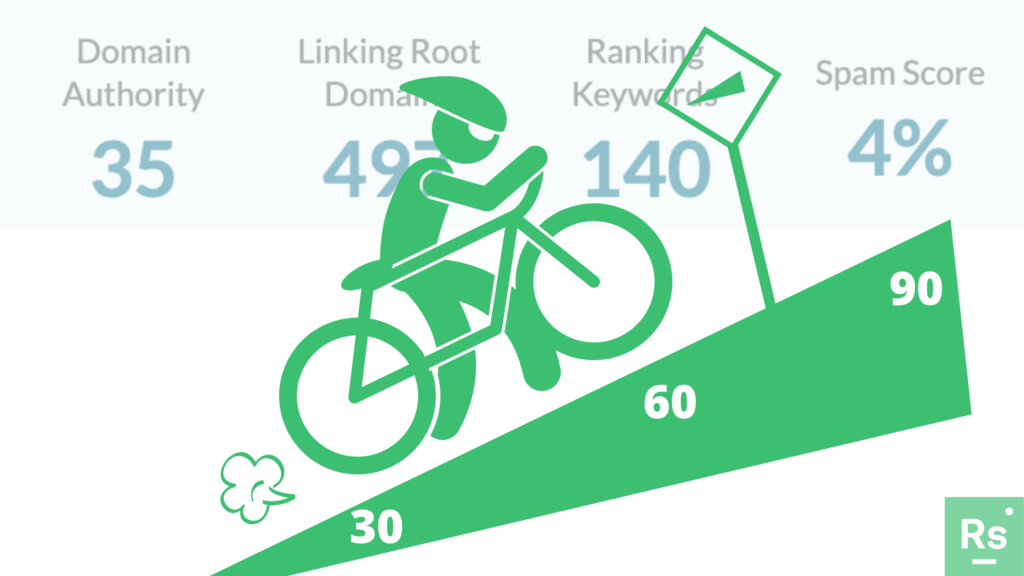In the SEO world, people have strong opinions about the existence of “domain authority” (lower case) and unfounded theories about “Domain Authority” (capital letters) as a driving force for Google indexing and ranking websites.
So answering the question, “What is Domain Authority?” means opening up a can of worms.
Even when we know what Domain Authority (DA) actually means, SEO and marketing folks tend to obsess about it because a DA score is a seemingly objective metric against which to measure the overall quality of our website. The harsh reality is that the powers that be who determine the factors that contribute to your DA score (like Moz and Google) constantly change the goalposts.
In February 2019, Moz released a new version of their Domain Authority algorithm in response to the major shifts in Google’s AI. Since then, Google has made 12 confirmed (and six unconfirmed) algorithm changes. That means at least every other month, there are new factors to consider when determining how your website measures up.
While every SEO marketer worth their salt wants a good grade on their website, improving your Domain Authority is a by-product of pursuing excellent SEO (and not vice versa).
If you’re concerned about increasing your DA score, let’s examine what DA is and why it’s important to consider. Let’s also clear up why it’s not the be-all and end-all of a great SEO strategy—and what you should focus on instead.
What is domain authority?
There’s a lot of confusion over what Domain Authority is, so let’s look at the actual definition to resolve some misperceptions.
SEO software company Moz developed Domain Authority as a way to assign a cumulative “grade” to your website based on its ability to compete with other websites for search engine result page (SERP) ranking.
Domain Authority is a competitive research tool for Moz users, in much the same way Keyword Planner is a research tool for Google Ads users. Since Domain Authority a free tool, SEO marketers have widely adopted it as a standard part of the SEO strategy-building process.
How domain authority works
SEO marketers use Domain Authority as a comparative research tool. You pop a domain (e.g., https://www.rankscience.com/wp-content/uploads/2020/10/DA-Blog-Banner-1.png.com) into the Domain Authority Checker, and the tool assigns a score based on a 100-point scale. The closer you are to 100, the likelier your domain is to outrank competitors on SERPs.
Since the DA scale is based on an algorithm, the more competitive your score, the harder it is to improve. Think of it like pedaling your bike up a hill: if your website scores a DA of 20 (at the bottom of the hill), it means there’s more opportunity to optimize and improve. Once you make a few changes, you can relatively quickly see your DA move up to 30.
But if your website scores an 80, it means you’ve done nearly everything you can to optimize your site. The effort curve is steeper as you get closer to 100. You’re going to have to put a lot more energy into pedaling that bike up the hill. Achieving a 90 at that point is often a matter of factors outside of your control, like backlink placement in other elite publications and social media mentions by big influencers.
Domain authority 2.0
As we mentioned earlier, in February 2019, Moz updated the scoring criteria for Domain Authority and released Domain Authority 2.0. According to SEO Blog, “The newest update focuses on the quality of the website design, pages, posts, backlinks, images and everything related to the website. The algorithm calculates one year of the website’s analytics and ranks the website accordingly.”
It also detects the presence of spam indicators and link manipulation (i.e., people buying/selling links) and assigns a Spam Score.
While Moz’s Domain Authority tool is the most widely adopted by SEO marketers, it isn’t the only domain-strength research tool in the industry. Other SEO software companies, such as Ahrefs and SEMRush, offer similar tools within their platforms.
What domain authority isn’t
The popularity of DA as a metric has led many misguided SEO marketing pros on a chase after the mythical “domain authority” as the holy grail of SEO excellence. Spoiler: DA isn’t what they think it is:
- It isn’t a predictor of page ranking—that’s Page Authority, Moz’s scoring rubric for how well a single web page will compete with other URLs for the same keyword searches.
- It isn’t a tool or metric that Google uses. John Mueller, Google’s webmaster trends analyst, has confirmed that their algorithms don’t use Domain Authority as a ranking signal.
- It isn’t a single technical feature or concept. There’s an unproven belief in the SEO industry that domain authority is a characteristic that websites develop as they accumulate age and links—kind of like how ivy grows on old buildings. But Google’s own statements and algorithm updates show that a website doesn’t need to be a certain age to rank higher than competitors.
- It isn’t a measure of “good” or “bad” SEO. DA isn’t a judgment on the quality of your website. You can have a beautifully optimized website but still get a lower DA score than a not-so-great website with a ton of links.
- It isn’t an absolute, static score. Your DA score goes up and down over time as you further optimize your website and build links and as Moz responds to changes in Google’s algorithm.
- It isn’t a driver of success. We can’t state this enough: Domain Authority does not cause your website to reach a position in the search rankings. It’s an indicator of your website’s competitiveness. That’s it.
So, does DA matter for your SEO strategy?
Increasing your Domain Authority is an indicator that your SEO strategy is working.
Domain Authority, as a research tool, is pretty reliable. Your website’s DA has a high correlation (not causation) with your ability to rank ahead of competitors, but that doesn’t mean it’s 100% accurate. Still, it’s a smart idea to check in with your DA score, among other factors, to gauge the overall competitiveness of your website.
Since DA has such a high correlation to SERP ranking, it can also help you prove the return on investment of your SEO initiatives. Your search engine ranking impacts the volume and quality of traffic to your website, which translates into business outcomes.
Your website’s DA has a high correlation (not causation) with your ability to rank ahead of competitors.
DA is also an attractive factor to potential referrers. When you have a higher DA, people are more likely to want to link to your website and place their links on yours to help boost their own DA.
Purchasing a domain name that has “high intent” for visitors searching for particular terms, resulting in a higher CTR from Google, can further help with Domain Authority, but it’s hard to quantify the impact.
What is a “good” DA score?
Notice that we have yet to use the phrase “good Domain Authority.” As we discussed earlier, assigning judgment to a higher or lower score doesn’t serve your SEO strategy.
DA isn’t a qualitative score. It’s a quantitative assessment of your competitive ranking. A Minor League Baseball team isn’t “bad” just because it doesn’t compete in the Major League.
A website with a 30 DA isn’t “bad” just because it can’t compete with websites with 90 DA. That would be like pitting a startup company’s blog against the Washington Post. Can it outrank the Post? Possibly, but the likelihood is extremely low.
4 reasons why you shouldn’t obsess over domain authority
All this to say—should you know what your website’s DA is and keep an eye on it? Yes. Is it something you should check and tweak in your daily SEO routine? Nope.
Here’s why:
1. There’s no single “DA dial” you can turn up
Domain Authority is just one vital stat of many to monitor on your SEO dashboard. You can also monitor stats such as the aforementioned Page Authority, Trust Flow, organic traffic, time on page, bounce rate, page speed, and more to determine the health of your website SEO.
Think of DA like a thermometer: your temperature is just one indicator of many factors happening in your body, not a diagnosis. No one brags about having a “perfect” temperature.
Instead, focus on making your website better for users and more attractive to web crawlers. A “higher” DA score will follow.
2. You have no control over time
All new domains start out with a DA score of 1. Even if you launch a technically perfect website out of the box, you still need to develop trust factors, like backlinks and social media mentions, from other high-ranking websites. That means you need to build meaningful relationships with other websites in your industry over time.
3. You have no control over what your competitors do or don’t do
DA is about your ability to compete. Some of your competitors have more resources than you. For example, a small design studio lacks the ability to churn out new content the way Canva does. Guess who has a higher Domain Authority?
That isn’t to say Canva’s content is superior to that of the small biz. There’s just more of it, which means more indexable content, which boosts the likelihood of ranking higher on SERPs for keywords both companies are targeting.
4. You have no control over updates
As we discussed earlier, Moz is always trying to keep up with Google’s ever-changing algorithms. It’s always a game of catch-up, and while Moz has gotten pretty good at anticipating updates and guessing the Googlebot criteria for ranking, it’s still just a guess.
Your DA score may drop after an updated Domain Authority, and that’s okay—it just means there’s newer, more accurate data about Google’s ranking signals.
The (non-obsessive) way to rank higher and increase your DA
There’s no growth hack to get a higher DA score. Instead, focus on old-fashioned, roll-up-your-sleeves, white-hat website optimization. Believe it or not, it really is that simple.
“A web page doesn’t need to have a high PageRank, Site Authority or Domain Authority in order to rank well,” says Search Engine Journal’s Roger Montti. “A page needs to be relatively spam free and generally have qualities that define a good user experience. Inbound links help build credibility that a page is useful. That’s enough to be considered for ranking.”
With that said, here are a few tactical ways to rank well:
Improve your on-page SEO factors
Your on-page SEO is all about creating a great experience for users and making technical choices to attract web crawlers so your site gets indexed.
Here are some things to consider about improving your on-page SEO:
User Experience (UX): Starting in 2021, Google will introduce a new ranking algorithm, called Google page experience, that considers (surprise!) users’ experiences. Get ahead of the game by answering the following about your site:
- Is it mobile-friendly?
- Does it load quickly?
- Does it run on HTTPS?
- Are there intrusive ads?
- Does content jump around as the page is loading?
Learn more about how A/B testing can help improve your user experience (and boost your SEO).
E-A-T: This delicious acronym stands for expertise, authoritativeness, and trustworthiness. It’s Google’s framework for assessing the quality of content creators and websites. Google’s algorithms are getting smarter and can sniff out crappy content, so when you publish stuff, be sure it’s worth your target audience’s time.
Learn more about how Natural Language Processing tools can help you craft high-quality content.
SEO content elements: SEO content elements include all the technical writing that help boost your signal to web crawlers:
- HTML title tags
- Meta descriptions
- Headlines and H2/H3 header tags
- Alt-image titles
Changes to these elements can significantly improve your ranking.
Learn more about how testing SEO content elements can turn into big wins for eCommerce sites.
Improve your off-Site SEO factors
Your off-site SEO is about achieving a level of respect and trust within your industry so others refer their own users to your website. Improving your off-site SEO works in a virtuous circle with your on-site SEO: the more valuable your content, the more people will trust you and link out to you, and the higher your authority—your real authority—will be.
Here are some elements that will help your off-site SEO:
Get high-authority links. One well-placed article can be the shot in the arm for your monthly traffic. Since the success of your content is ultimately in the hands of your readers, don’t obsess over getting links placed.
“It’s really difficult to predict exactly what will resonate and why,” says Jimmy Daly, former director of marketing for a digital agency. “ If you choose to try your hand at a shot-in-the-arm strategy, don’t dedicate more than about 10-15% of your content creation time to it.”
Learn more about placing high-authority links.
Avoid toxic links. Google frowns on the manipulation of link placement to improve ranking. But let’s face it: what SEO strategy isn’t focused on backlinking? That said, be aware of who is linking to your site. If a shady site decides to link to your website, you don’t have a lot of control. But there are some toxic linking tactics you can avoid:
- Paid links
- Exact-match anchor-text links
- Private blog networks (PBNs)
- Links from plagiarized articles
- Links from spammy blog comments
- Links from spammy directories
- Large-scale, highly promotional guest posting campaigns
Learn more about avoiding toxic backlinks.
Your SEO strategy is about more than optimizing for a single metric
Don’t be that kid in class who obsesses about getting the best grade instead of focusing on learning. Domain Authority exists to continually guide you toward better SEO so you can provide a better experience for your users. And that’s the goal you should always obsess over.





